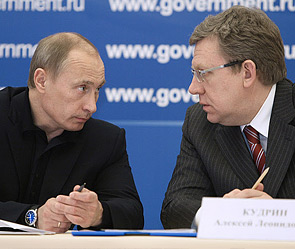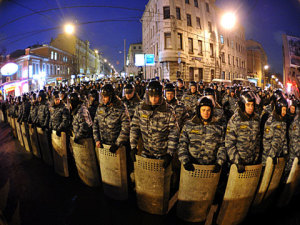
On April 16, during this year’s call-in in a live broadcast on the Russian state TV, Vladimir Putin answered the questions of TV viewers and studio guests among which was Former Finance Minister Alexei Kudrin. Thus, Vladimir Putin’s “direct line” was supposed to become an attempt at a dialogue not only with the Russian people but also with so-called system liberals and reformers who have always been close to the Russian government in the post-Soviet times through either holding government positions or serving as advisers on the country’s financial and economic policy. However, the dialogue ended before it began: the much publicized exchanges between the president and his former finance minister showed that reformers cannot influence the Kremlin’s policy anymore. Putin is not just unwilling to introduce reforms — he does not even want to touch on this subject since he believes that this may result in the collapse of his regime.
“Unless we start acting today, including on the issue of structural reform, tomorrow we may enter a prolonged period of economic stagnation. We continue to live in a predominantly rent-based economy, rather than in a production-based one. Our economic system, at bottom, has hardly changed.” It is rather amusing that these words do not belong to the court liberal Kudrin although he keeps making similar statements year after year. This statement was made by Putin himself on April 3, 2001. It took the Russian president 14 years to openly admit his opposition to reforms.
Putin got tired of liberals mumbling about reforms. “I know your position very well,” Putin said to Kudrin who had been responsible for the country’s budget policy for 12 years before being fired by then president Medvedev. It is no coincidence that Kudrin asked his question publicly since he has no other opportunities left to influence the Kremlin’s policy, and this was the last attempt of liberals and reformers at convincing the tsar of the necessity to introduce structural reforms.
It has until now been assumed that Putin hypothetically realizes the necessity of carrying out market reforms, and it is only due to external factors that he does not show enough political will to set them underway. There has always been something that prevented the Russian president from going ahead with reforms. In 2000, Putin was busy building the “vertical of power;” in 2003, he was fighting against oligarchs, and in 2004 and 2005, against terrorists; in 2007, it was the interference of the West; in 2009, Putin was afraid to lose control over the situation during Medvedev’s presidency; in 2012, he had to deal with mass opposition protests, and in 2014, with sanctions. And finally, answering Kudrin’s question, Putin honestly admitted that he believes reforms to be a priori dangerous.
Putin made a choice between reforms and populism and declared that the former result in a loss of trust in the government (and consequently in lower poll standings). One has to assume that populism will help building up electorate to such an extent that even a very grave economic crisis will have no effect on the regime’s poll standings. While studiously trying to maintain a semblance of social well-being of the majority of Russians, Putin’s government has never learned — and does not even want to make an effort — to solve serious economic issues that the country is facing.

The Kremlin’s economic policy is becoming increasingly inert since any reforms, including the most overdue ones, are considered a threat to the regime’s stability. Reality is harsh. Growing signs of crisis in the absence of reform manifest themselves in wage violations on large state-owned construction projects, late payments of education maintenance allowance to university students, blocked highways in a protest against the abolishment of suburban commuter trains, and healthcare workers strikes. Funds that can be used to patch up holes in the budget are still available, but they are unlikely to last. Putin’s main miscalculation consists in the fact that the effect of a possible prolonged systemic crisis on the electorate will be much more destructive and uncontrollable without structural reforms.





